Goldenbee: 2016 Top 10 CSR Events in China
2017-02-14Sino-Swedish Corporate Socialadmin0010
Since 2006, China WTO Tribune has set up an annual column of the top 10 CSR domestic and international events in the past year. The selection of the top 10 CSR events is based on news collection on daily basis and consultation with a group of CSR experts from government, enterprises, universities and research institutions, in order to make sure an open and transparent selection process as well as professionalism and authority of the list.
The Top 10 CSR Events in China follows in the chronological order.
No.01 Ten ministries jointly released Guiding Opinions on Promoting Green Consumption

On March 1, 2016, Guiding Opinions on Promoting Green Consumption (The Opinions) formulated by China National Development and Reform Commission and other nine ministries, was published. The Opinions arrays green product consumption, green service supply and financial support. It proposes to support the development of sharing economy and a healthy, low-carbon lifestyle.
Reason for listing:
Green consumption lies in the essence in face of the problem of energy and resources shortage. It is also a necessary to maintain ecological balance. The Opinions aims to make the government into full paly and encourage the public by emphasizing consumption idea and setting up a long term mechanism. Multiple efforts will help enhance public awareness on green consumption. The slogan “responsible consumption promotes sustainable development” provides a practical and innovative method on the way to a green and resource-saving society, and delivers a practical “do-it -now” code of conduct.
Related events:
No.02 Charity Law of China is adopted and implemented.
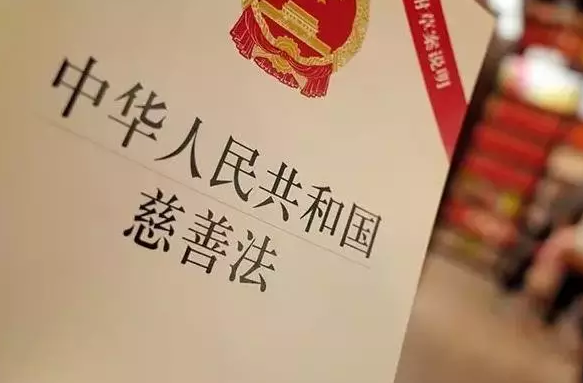
The Charity Law of People’s Republic of China was approved on the fourth session of the 12th National People’s Congress on March 16. It has taken into effect since September 1.The Charity Law clarifies charity events, outlines rules on the operation of charitable organizations, the sources and use of charitable properties and participation in charity services. September 5 will henceforth be “China Charity Day”.
Reason for listing
As a profound step towards public participation in legislation, the Charity Law closes many administrative loopholes in charitable activities, ushering a new era in which each citizens participates in charity ruled by law. Boosted by the Charity Law, philanthropy in China will enter a stage with more transparency and fairness that withstands public supervision and improves quality of public welfare. The legislation gives credit to public charity and places enterprise philanthropy on a legal footing. Furthermore, following the adoption of the Charity Law, a series of supportive documents were published. It will push forward the construction of China charity legal system, and complement for CSR legislation and implementation of CSR-related laws.
Related Events
No.03 Chinese President Xi Jinping stressed social responsibility for Internet enterprises

On April 19, President Xi Jinping addressed on a symposium on cyber security and informatization that the meaningful wealth is the wealth that contributes to society. He stressed in the speech that only those shoulder social responsibilities are competitive and vigorous enterprises. Enterprises should not only fulfill its economic and legal responsibility, but also moral and social obligations. The bigger enterprise is, the greater social and moral responsibility will be with the higher expectation from the public.
Reason for Listing:
The fast development of Internet turns out to be a “paradox”. Aside from both benefits and harms it brings about, the Internet not only provides solutions to development challenges, but also generates new problems. Frequently-occurring scandals, such as Internet infringement and fraud, placed Internet industry in China under the center of public spotlight. President Xi opened new views, highlighted new changes and proposed requirements for Internet development at the symposium. Supported by theories of responsibility and connotations of wealth, these requirements are problem-oriented with an aim to help enterprises find the solution by fulfilling social responsibility and improving competitiveness. Therefore, Internet enterprises should focus on the sustainability of Internet to lay out their business, correct development deviation and strengthen their competitiveness.
Related events:
No. 04 The first Green House Gases Emissions Report of Chinese central SOEs released by CHD
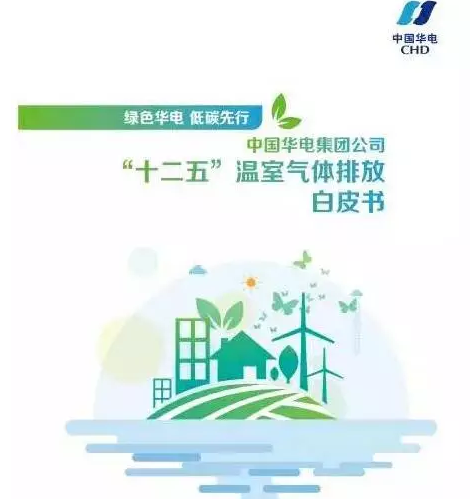
On June 6, China Huadian Corporation (CHD) released the White Paper: China Huadian Corporation Green House Gases Emissions in 12th Five-Year Plan Period at a press conference in Beijing. This is the first greenhouse gases emissions report released by Chinese central SOEs since China signed the Paris Agreement on climate change.
Reason for listing:
China’s signing on the Paris Agreement built up China’s global image as a big, responsible developing country willing to share global responsibilities on climate change and take part in global governance. As an active response to the Paris Agreement, CHD took the lead in releasing the white paper, comprehensively showing its new methods, ideas and achievements on energy conservation and emission reduction during the 12th Five-Year Plan period. The carbon reduction plan for the 13th Five-Year Plan Period was also laid out in the white paper, which showed central SOEs’ high efficiency, intensive efforts and quick response. The white paper not only demonstrates its new approaches to social responsibility, but also provides low-carbon models for electricity sector.
Related events:
No.05 China SASAC issued Guiding Opinions on Better Fulfilling Social Responsibilities of State-owned Enterprises

On July 1, the State-owned Assets Supervision and Administration Commission of the State Council (SASAC) issued Guiding Opinions on Better Fulfilling Social Responsibilities of State-owned Enterprises. The Opinions identifies three principles for SOEs in fulfilling social responsibilities: focusing on sustainable development, reconciling CSR with corporate reform and development, and integrating CSR into business operation.
Reason for listing:
The Opinions has milestone significance on promoting SOEs CSR fulfillment. With broader range, farther direction, deeper thought, specific goals, systemic content and flexible approach, the Opinions provides feasible guidelines for SOEs to enhance responsibility competitiveness and realize sustainable development. The Opinions will undoubtedly play an important role in deepening SOE reforms, promoting SOEs to go global and strengthening implementation of Belt and Road Initiative. It will help SOEs hold on the “commanding heights” of global enterprise management and development, and strengthen their confidence in Chinese-style path, socialist theory and socialist system.
Related events:
No.06 The first PIL case on air pollution in China
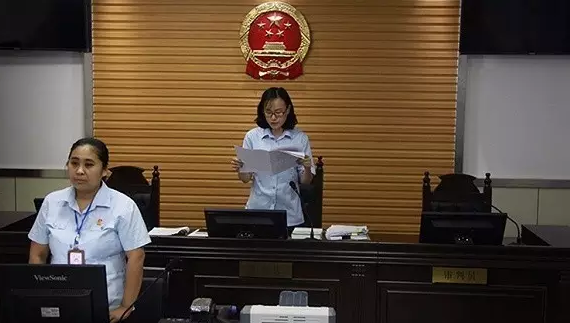
On July 20th, Dezhou Intermediate People’s Court announced its first-instance verdict on an environmental public interest litigation (PIL) between All-China Environment Federation (ACEF) and Dezhou Jinghua Group Corporation. Dezhou Jinghua Group Corporation was sentenced to pay 21.9836 million RMB as compensation for the losses caused by its excessive discharges of pollutants and make a public apology on media above provincial level. The compensation will be used to improve air quality in Dezhou. Other litigation claims from the ACEF were dismissed.
Reason for listing:
This case is unprecedented as it is the first PIL case on air pollution in China since the new Environmental Protection Law was enacted. To severely punish enterprises’ polluting behaviors as a warning to others can not only raise enterprises’ awareness of the rule of law in environment governance, but also set bottom lines for their environmental responsibility, thereby rebuilding trust with people, protecting interests of people and bringing back good environment to people. It is thought-provoking for some tough questions, such as how to strengthen local government responsibility on environmental protection and set up an environmental assessment agency as an objective third party. It is necessary to place environmental issues as priority and prevent pollutions from the very beginning. As a result, there will be less pollutions but more preventions.
Related events:
No.07 Guidance on Social Responsibility of Information and Communication Technology Industry released
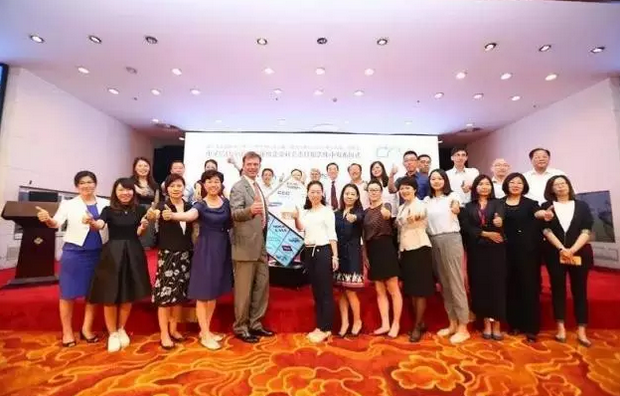
On August 30, SJ/T 16000-2016 Guidance on Social Responsibility of Information and Communication Technology Industry (the Guidance) was released. The Guidance is formulated based on ISO 26000: Guidance on Social Responsibility, and GB/T 36000 Guidance on Social Responsibility (the national CSR standard of China).Based on the features and practices in ICT industry, the Guidance identifies the basic CSR purpose, principle and practices, and clarifies 10 core topics and 31 issues.
Reason for listing:
The Guidance is the first CSR guidance that matches the national CSR standard GB/T 36000. The Guidance is development-orientated and can be seen as the common cognition and action framework of ICT industry in CSR field. It helps ICT enterprises to exploit their specialties and core advantages to establish a sustainable business mode. The industry guidance improves the ICT industry competitiveness, strengthens international competitiveness and promotes the soft power. It is also a good reference for other industry CSR standards research.
Related events:
No.08 China’s National Plan on Implementation of the 2030 Agenda for Sustainable Development released
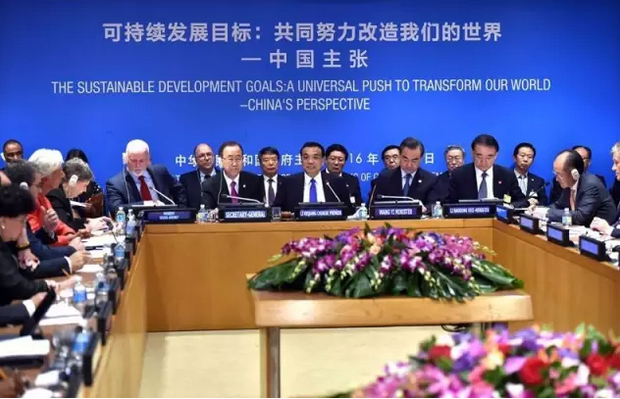
On September 19, Premier Li Keqiang chaired the symposium of "the Sustainable Development Goals: A Universal Push to Transform Our World---China's Perspective" at the UN headquarters in New York, and announced the release of China's National Plan on Implementation of the 2030 Agenda for Sustainable Development. The National Plan consists of five parts: achievements and experience in China's implementation of the Millennium Development Goals, opportunities and challenges, guiding thoughts and general principles, overall approaches and implementation plans for 17 sustainable development goals for 2030 Agenda.
Reason for listing:
China’s National Plan on Implementation of the 2030 Agenda for Sustainable Development is a guideline for implementing Sustainable Development Goals and Chinese’ government commitment to the global sustainable development. China focuses on project connection and promotes combination between the national plan, the G20 Summit, Belt and Road Initiative and the 13th Five-Year Plan, setting an example to developing countries. This shows China’s positive involvement in global economic governance and its willingness to take the international responsibility matching its capability. China works with international society to contribute to the realization of global sustainable development and the establishment of international order.
Related Event:
No.09 The 1st Foreign-Invested Enterprises CSR forum held in Shanghai
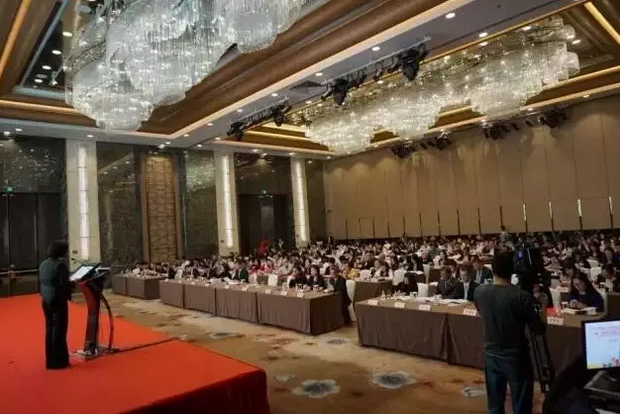
On October 28, Shanghai Municipal Commission of Commerce and Shanghai Association of Enterprises with Foreign Investment co-hosted the 1st Foreign-Invested Enterprises CSR forum in Shanghai. The forum published the list of Top 100 Foreign-Invested Enterprises in Shanghai in 2015 measured by operating revenue, total value of import and export, tax amount, and employment. The list of CSR reports released by foreign-invested enterprises was also released.
Reason for listing:
This is the first time for Shanghai to host the foreign-invested enterprises CSR forum. It shows that foreign-invested enterprises in China are more open, friendly and sharing. It is also a symbol of Shanghai regional responsible competitiveness. Foreign- invested enterprises root in China and put more efforts in fulfilling social responsibility, which not only benefits themselves for sustainable development, but also promotes the advanced global practice theory to be implemented in China. It contributes to the international development with Chinese experience and drives the social innovation based on the advantage of supply chain. The forum has significance in improving domestic regional responsible competitiveness and social responsibility construction in domestic relevant industries.
Related events:
No.10 The Beauty of Chinese Enterprise Abroad --- Images of Chinese CSR Along the Belt and Road

On December 8, on the second meeting of the seventh board of directors of China International Contractors Association, the results of “The Beauty of Chinese Enterprise Abroad --- Images of Chinese CSR Along the Belt and Road” awards was revealed. Since launched in August 2016, over 1600 photos from 45 enterprises have been received. The photos reflect 200 responsible projects in 84 regions. They show responsible operation and management of Chinese enterprises overseas.
Reason for listing:
Since "The Beauty of Chinese Enterprise Abroad --- Images of Chinese CSR Along the Belt and Road" activity was launched, the word “image” becomes a new pet phrase for CSR practitioners in 2016 and a new weather vane of CSR practices. It is an innovative approach to overseas CSR communication by using image to discover how Chinese enterprises fulfill CSR and shape their overseas image, and further spread the harmonious and win-win concepts of “Belt and Road”. A large number of enterprises have been attracted to join this activity. Some excellent enterprises’ participation and practices indicates the foreseen trend is taking place. A great approach to disseminate the abroad image of Chinese enterprises and tell their story abroad is to exploit the image, language and symbol of pictures as tool.
Related events:
The Top 10 CSR Events in China follows in the chronological order.
No.01 Ten ministries jointly released Guiding Opinions on Promoting Green Consumption

On March 1, 2016, Guiding Opinions on Promoting Green Consumption (The Opinions) formulated by China National Development and Reform Commission and other nine ministries, was published. The Opinions arrays green product consumption, green service supply and financial support. It proposes to support the development of sharing economy and a healthy, low-carbon lifestyle.
Reason for listing:
Green consumption lies in the essence in face of the problem of energy and resources shortage. It is also a necessary to maintain ecological balance. The Opinions aims to make the government into full paly and encourage the public by emphasizing consumption idea and setting up a long term mechanism. Multiple efforts will help enhance public awareness on green consumption. The slogan “responsible consumption promotes sustainable development” provides a practical and innovative method on the way to a green and resource-saving society, and delivers a practical “do-it -now” code of conduct.
Related events:
- On August 3, “2016 Sustainable Seafood Week” was launched in Beijing. Marine Stewardship Council (MSC), together with international chain hotels and e-commerce platforms, fulfilled the 2016 Rio Olympic Game commitment to sustainable seafood products, and shared thoughts on traceability of the topic “from ocean to dining table”.
- On November 4, Chinese E-Commerce Research Centre published 2016 China Consumer Online Consumption Report and Online Shopping Direction. It indicates that the green consumption has become a new trend for the online market.
No.02 Charity Law of China is adopted and implemented.

The Charity Law of People’s Republic of China was approved on the fourth session of the 12th National People’s Congress on March 16. It has taken into effect since September 1.The Charity Law clarifies charity events, outlines rules on the operation of charitable organizations, the sources and use of charitable properties and participation in charity services. September 5 will henceforth be “China Charity Day”.
Reason for listing
As a profound step towards public participation in legislation, the Charity Law closes many administrative loopholes in charitable activities, ushering a new era in which each citizens participates in charity ruled by law. Boosted by the Charity Law, philanthropy in China will enter a stage with more transparency and fairness that withstands public supervision and improves quality of public welfare. The legislation gives credit to public charity and places enterprise philanthropy on a legal footing. Furthermore, following the adoption of the Charity Law, a series of supportive documents were published. It will push forward the construction of China charity legal system, and complement for CSR legislation and implementation of CSR-related laws.
Related Events
- Regulations on Venture Philanthropy for Social Organization in Tianjin (DB12/T634–2016 ) was enacted on June 17 and put into effect since July 15. It sets a provincial standard of venture philanthropy procedure for social organizations with support from both the government and social forces.
- On December 1, “Luo Er Incident” provoked reflections on voluntary services and triggered discussions on the legal basis of online and individual charitable activities.
No.03 Chinese President Xi Jinping stressed social responsibility for Internet enterprises

On April 19, President Xi Jinping addressed on a symposium on cyber security and informatization that the meaningful wealth is the wealth that contributes to society. He stressed in the speech that only those shoulder social responsibilities are competitive and vigorous enterprises. Enterprises should not only fulfill its economic and legal responsibility, but also moral and social obligations. The bigger enterprise is, the greater social and moral responsibility will be with the higher expectation from the public.
Reason for Listing:
The fast development of Internet turns out to be a “paradox”. Aside from both benefits and harms it brings about, the Internet not only provides solutions to development challenges, but also generates new problems. Frequently-occurring scandals, such as Internet infringement and fraud, placed Internet industry in China under the center of public spotlight. President Xi opened new views, highlighted new changes and proposed requirements for Internet development at the symposium. Supported by theories of responsibility and connotations of wealth, these requirements are problem-oriented with an aim to help enterprises find the solution by fulfilling social responsibility and improving competitiveness. Therefore, Internet enterprises should focus on the sustainability of Internet to lay out their business, correct development deviation and strengthen their competitiveness.
Related events:
- On April 12, Wei Zexi Incident brought public attention to paid listing model on some online information platform, such as Baidu Online Marking Service API.
- On September 9, Wang Xin, Chief Executive Officer of Shenzhen QVOD Technology--a company on Internet and streaming media technology development and application--and other Senior management involved, pled guilty of broadcasting pornography online for profit.
- On November 7, the Cyber Security Law of People’s Republic of China was approved. It will take into effect in June 2017. As the first law on cyber security in China, it clarifies cyberspace sovereignty principles and defines security obligations for Internet-product-and-service providers and operators.
No. 04 The first Green House Gases Emissions Report of Chinese central SOEs released by CHD

On June 6, China Huadian Corporation (CHD) released the White Paper: China Huadian Corporation Green House Gases Emissions in 12th Five-Year Plan Period at a press conference in Beijing. This is the first greenhouse gases emissions report released by Chinese central SOEs since China signed the Paris Agreement on climate change.
Reason for listing:
China’s signing on the Paris Agreement built up China’s global image as a big, responsible developing country willing to share global responsibilities on climate change and take part in global governance. As an active response to the Paris Agreement, CHD took the lead in releasing the white paper, comprehensively showing its new methods, ideas and achievements on energy conservation and emission reduction during the 12th Five-Year Plan period. The carbon reduction plan for the 13th Five-Year Plan Period was also laid out in the white paper, which showed central SOEs’ high efficiency, intensive efforts and quick response. The white paper not only demonstrates its new approaches to social responsibility, but also provides low-carbon models for electricity sector.
Related events:
- On September 11, China Resource Land released its 2015 Social Responsibility Report for the third consecutive year. Since 2014, all subsidiaries of China Resources have started to compile and release independent CSR reports or the simple version of CSR reports, thereby promoting its CSR management by CSR reporting.
- On December 1, China National Nuclear Power (CNNP) published White Paper on CNNP Public Communication, calling for more extensive social forces and resources to support development of nuclear power in China.
No.05 China SASAC issued Guiding Opinions on Better Fulfilling Social Responsibilities of State-owned Enterprises

On July 1, the State-owned Assets Supervision and Administration Commission of the State Council (SASAC) issued Guiding Opinions on Better Fulfilling Social Responsibilities of State-owned Enterprises. The Opinions identifies three principles for SOEs in fulfilling social responsibilities: focusing on sustainable development, reconciling CSR with corporate reform and development, and integrating CSR into business operation.
Reason for listing:
The Opinions has milestone significance on promoting SOEs CSR fulfillment. With broader range, farther direction, deeper thought, specific goals, systemic content and flexible approach, the Opinions provides feasible guidelines for SOEs to enhance responsibility competitiveness and realize sustainable development. The Opinions will undoubtedly play an important role in deepening SOE reforms, promoting SOEs to go global and strengthening implementation of Belt and Road Initiative. It will help SOEs hold on the “commanding heights” of global enterprise management and development, and strengthen their confidence in Chinese-style path, socialist theory and socialist system.
Related events:
- On October 14, the Guiding Opinions on Fulfilling Social Responsibility of Beijing Municipal SOEs was published by the State-owned Assets Supervision and Administration Commission of People’s Government of Beijing Municipality. It proposed five basic principles, three goals and ten items in SOEs social responsibility fulfillment in Beijing.
- In November, the 13th Five-Year Plan for Economic and Social Development for Central SOEs was officially issued, which aimed to build five types of enterprises: Internet-based, platform-based, service-oriented, brand-oriented and responsible enterprises.
No.06 The first PIL case on air pollution in China

On July 20th, Dezhou Intermediate People’s Court announced its first-instance verdict on an environmental public interest litigation (PIL) between All-China Environment Federation (ACEF) and Dezhou Jinghua Group Corporation. Dezhou Jinghua Group Corporation was sentenced to pay 21.9836 million RMB as compensation for the losses caused by its excessive discharges of pollutants and make a public apology on media above provincial level. The compensation will be used to improve air quality in Dezhou. Other litigation claims from the ACEF were dismissed.
Reason for listing:
This case is unprecedented as it is the first PIL case on air pollution in China since the new Environmental Protection Law was enacted. To severely punish enterprises’ polluting behaviors as a warning to others can not only raise enterprises’ awareness of the rule of law in environment governance, but also set bottom lines for their environmental responsibility, thereby rebuilding trust with people, protecting interests of people and bringing back good environment to people. It is thought-provoking for some tough questions, such as how to strengthen local government responsibility on environmental protection and set up an environmental assessment agency as an objective third party. It is necessary to place environmental issues as priority and prevent pollutions from the very beginning. As a result, there will be less pollutions but more preventions.
Related events:
- On April 11, Xuzhou Intermediate People’s Court held a court trail on an environmental public interest lawsuit of Hongshun Paper Corporation brought by Xuzhou People’s Procuratorate.
- On December 6, Ministry of Environment Protection published the Technical Guidelines for Environmental Impact Assessment of Construction Projects(HJ2.1-2016). The Guidelines stipulates that public participation should be separated from the compiling work on environmental impact assessment report. In other words, “public participation” will not be an evaluating item in reports issued by any environmental assessment agencies, but should be conducted and reported by enterprises independently.
- On December 21, Luoyang Intermediate People’s Court held an open trial on an environmental pollution liability disputes between Henan CSR Promotion Center and Mao Yanqiang, Fan Linye, Tongxin Mercury Corporation, Inner Mongolia Dong Xing Chemical Corporation and Baoyun Chemical Dangerous Goods Transport Corporation.
No.07 Guidance on Social Responsibility of Information and Communication Technology Industry released

On August 30, SJ/T 16000-2016 Guidance on Social Responsibility of Information and Communication Technology Industry (the Guidance) was released. The Guidance is formulated based on ISO 26000: Guidance on Social Responsibility, and GB/T 36000 Guidance on Social Responsibility (the national CSR standard of China).Based on the features and practices in ICT industry, the Guidance identifies the basic CSR purpose, principle and practices, and clarifies 10 core topics and 31 issues.
Reason for listing:
The Guidance is the first CSR guidance that matches the national CSR standard GB/T 36000. The Guidance is development-orientated and can be seen as the common cognition and action framework of ICT industry in CSR field. It helps ICT enterprises to exploit their specialties and core advantages to establish a sustainable business mode. The industry guidance improves the ICT industry competitiveness, strengthens international competitiveness and promotes the soft power. It is also a good reference for other industry CSR standards research.
Related events:
- On September 20, GoldenBee CSR Consulting, Shanghai Academy of Quality Management, Registro Italiano Navale, China WTO Tribune and other organizations established “Mega Events Sustainable Development System Promotion Alliance”.
- On September 21, the 1st CSR Annual Meeting of ICT industry was held, and China’s ICT Industry CSR Report 2015 and CSR management system in China’s ICT industry were released.
- On November 7 and 8, Declaration on Regional Collaborative Governance of Responsible Supply Chain in the Asian Textile and Garment Industry was signed.
No.08 China’s National Plan on Implementation of the 2030 Agenda for Sustainable Development released

On September 19, Premier Li Keqiang chaired the symposium of "the Sustainable Development Goals: A Universal Push to Transform Our World---China's Perspective" at the UN headquarters in New York, and announced the release of China's National Plan on Implementation of the 2030 Agenda for Sustainable Development. The National Plan consists of five parts: achievements and experience in China's implementation of the Millennium Development Goals, opportunities and challenges, guiding thoughts and general principles, overall approaches and implementation plans for 17 sustainable development goals for 2030 Agenda.
Reason for listing:
China’s National Plan on Implementation of the 2030 Agenda for Sustainable Development is a guideline for implementing Sustainable Development Goals and Chinese’ government commitment to the global sustainable development. China focuses on project connection and promotes combination between the national plan, the G20 Summit, Belt and Road Initiative and the 13th Five-Year Plan, setting an example to developing countries. This shows China’s positive involvement in global economic governance and its willingness to take the international responsibility matching its capability. China works with international society to contribute to the realization of global sustainable development and the establishment of international order.
Related Event:
- On June 7, in order to fulfill UN 2030 Agenda for Sustainable Development, China WTO Tribune, Global Compact China Network and enterprises launched the “GoldenBee Global CSR 2030 Initiative”. This promotes sustainable development to a higher and wider dimension.
- On August 22, China Summit on Achieving SDGs, hosted by Global Compact China Network and organized by China Global Public Relationship Company, was held in Beijing.
- On December 13, the State Council published the Construction Plan of Innovative Demonstration Area on Implementation of the 2030 Agenda for Sustainable Development. The plan proposed four main construction tasks.
No.09 The 1st Foreign-Invested Enterprises CSR forum held in Shanghai

On October 28, Shanghai Municipal Commission of Commerce and Shanghai Association of Enterprises with Foreign Investment co-hosted the 1st Foreign-Invested Enterprises CSR forum in Shanghai. The forum published the list of Top 100 Foreign-Invested Enterprises in Shanghai in 2015 measured by operating revenue, total value of import and export, tax amount, and employment. The list of CSR reports released by foreign-invested enterprises was also released.
Reason for listing:
This is the first time for Shanghai to host the foreign-invested enterprises CSR forum. It shows that foreign-invested enterprises in China are more open, friendly and sharing. It is also a symbol of Shanghai regional responsible competitiveness. Foreign- invested enterprises root in China and put more efforts in fulfilling social responsibility, which not only benefits themselves for sustainable development, but also promotes the advanced global practice theory to be implemented in China. It contributes to the international development with Chinese experience and drives the social innovation based on the advantage of supply chain. The forum has significance in improving domestic regional responsible competitiveness and social responsibility construction in domestic relevant industries.
Related events:
- On October 25, Tsinghua University and Volvo Group co-hosted Global Sustainable Infrastructure and Connectivity Summit. The summit aims to explore sustainable infrastructure development paths and promote global sustainable infrastructure and connectivity. Volvo Group also released White Paper on Transportation Solutions and Connectivity.
- On December 7, Goldwind Science &Technology Company announced its wholly- owned subsidiary Beijing Tianrun New Energy Investment Company start cooperation with Apple Company on wind project. Goldwind Science &Technology Company transferred the 30% stock equity possession of four subsidiaries to Apple respectively. This is the third time investment of Apple in the field of new energy in China.
- On December 14, a press conference on the “2016 Best CSR Practices of Foreign-Invested Enterprises in China” was held in Beijing. This conference was hosted by China Association of Enterprises with Foreign Investment and organized by China WTO Tribune. The Index Report of Best CSR Practices of Foreign-Invested Enterprises in China was released on the press conference. The report shows that CSR index of foreign-invested enterprises slightly declines, but it is still in a high standard compared with other types of enterprises.
No.10 The Beauty of Chinese Enterprise Abroad --- Images of Chinese CSR Along the Belt and Road

On December 8, on the second meeting of the seventh board of directors of China International Contractors Association, the results of “The Beauty of Chinese Enterprise Abroad --- Images of Chinese CSR Along the Belt and Road” awards was revealed. Since launched in August 2016, over 1600 photos from 45 enterprises have been received. The photos reflect 200 responsible projects in 84 regions. They show responsible operation and management of Chinese enterprises overseas.
Reason for listing:
Since "The Beauty of Chinese Enterprise Abroad --- Images of Chinese CSR Along the Belt and Road" activity was launched, the word “image” becomes a new pet phrase for CSR practitioners in 2016 and a new weather vane of CSR practices. It is an innovative approach to overseas CSR communication by using image to discover how Chinese enterprises fulfill CSR and shape their overseas image, and further spread the harmonious and win-win concepts of “Belt and Road”. A large number of enterprises have been attracted to join this activity. Some excellent enterprises’ participation and practices indicates the foreseen trend is taking place. A great approach to disseminate the abroad image of Chinese enterprises and tell their story abroad is to exploit the image, language and symbol of pictures as tool.
Related events:
- On March 24, China Road and Bridge Corporation released 2015 CSR Report on Mombasa-Nairobi SGR Project in Nairobi, capital of Kenya. This is the first overseas social responsibility report of Chinese enterprises with a project as the carrier. It aims to promote local living quality and explore the approach to win-win development for both China and Kenya.
- On June 16, China Federation of Industrial Economics published the Chinese Enterprises CSR Route Map along “Belt and Road” for the first time to promote those enterprises better fulfill CSR and promote regional sustainable development.
- On November 22, China Chamber of Commerce of Metals Minerals & Chemicals Importers & Exporters(CCCMC), Department for International Development (DFID) and GIZ launched the Project “Guidelines for Social Responsibility in Outbound Mining Investments- Sustainable Mining Industry” in Beijing.
Best Practices
- The 100-year brand — Air Liquide also has a sense of juvenile
- Beijing Public Transportation Corporation: Developing green transportation to build a harmonious and livable capital
- CGN: Building a modern factory in barren deserts and developing a new win-win cooperation model along “Belt and Road”
Upcoming Event

All the materials on the site “Source: XXX (not from this site)” have been reprinted from other media. They do not imply the agreement by the site.
All the materials with “Source: CSR-China Website” are the copyright of CSR-China Website. None of them may be used in any form or by any means without permission from CSR-China Website.
GoldenBee Official WeChat
Copyright © Csr-china.net All Right Reserved.
京ICP备19010813号










